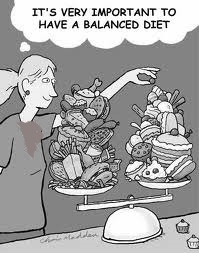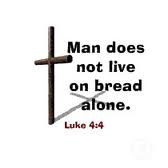
Balance in eating is very important to growing up. Let us think about our tightrope again:

Walking on a tightrope requires balance. If the tightrope walker leans too far in one direction, he could have a fatal fall. When it comes to eating, we also need to learn how to have a balanced diet.

Throughout our lives (from birth to death) we need the right kind of balance when it comes to food and nourishment. Sometimes you will hear people talking about "eating a balanced meal" (the kind of meal that contains the different kinds of foods that your body needs).
Here are some of the things your body needs to be healthy: fruits (can you name some?), vegetables (can you name some?), proteins (can you name some?), whole grains or enriched breads and cereals, and fats. If you were to just eat bread for supper, would this be a balanced meal? If you were to only eat ice cream for breakfast, would this be a balanced meal?
Balance is a must because your body demands and needs all of
these things for good and strong bones, teeth, eyes, tissue, muscles, organs,
blood, skin, hair, etc. We need these things
to grow and to stay healthy and not to
fall from a state of health (and be sick).
It is good to eat different kinds of food, but what happens when certain foods are not available? Can you eat what you do not have? ________ Can you eat what you cannot buy at the grocery store? _________ What happens if you cannot have fruit or some other food every day because of its cost? Suppose the orange crop was destroyed in Florida because of freezing weather and suppose this made the price of oranges go up to $20.00 each. Would your family buy oranges at this price? What if the peanut crop were to fail and the cost of a pound of peanut butter were $35.00? Would you be able to have many peanut butter sandwiches?
There are some foods that we do not always have because they are seasonal. For example, most people in our country do not eat watermelon in February. If we cannot have certain foods, does this mean that we will be unhealthy and will stop growing?
We should remember that there are certain peoples of the world who do not have all of the different kinds of foods like fruit, meat, vegetables, milk, etc. For example, do you think that an Eskimo eats the same kinds of foods that you do? What are some things that you eat that an Eskimo would not eat? What are some things that an Eskimo might eat that you might not eat? Because Eskimos do not eat certain kinds of foods, does this mean that these people are unhealthy? _______ Think of people who live in Southeast Asia. Many of them eat rice for breakfast, lunch and dinner (along with other foods). Do they survive with such a diet or do they become sick and die? Can you think of other peoples of the world who do not have the kinds of food that we have?
Even though our bodies need certain things for physical health and life, God the Creator of the world (the One who made its seasons and its climates) has made it possible for people to exist in the North Pole area, in hot desert lands, and in areas where it is both hot and cold.
Our bodies are "F__________________ and W_________________ made" (Psalm 139:14). When is the last time you thanked God for your body and for the health of your body? Think about what man makes and what God makes. How old is your family car? ______________ How old are you? ____________ Are you older than the family car? How much longer do you expect to live (Psalm 90:10)? ___________________ How much longer do you expect to have your family car (before it is put into the junkyard)? _________ How many times have you been in the hospital? ________ How many times has your family car been in the shop (for repairs, etc.)? _________ Are you thankful that God has made you better than men make cars?
God gives us existence to be able to know Him and have
His life: "And this is __________ eternal, that they might _____________
Thee the only true _________, and Jesus Christ whom Thou hast sent" (John 17:3).
We need to learn to be thankful for all creation and for all its
creatures.
When man was first created to live upon the earth, what did God give him to eat? (See Genesis 1:29 and circle the correct answer.)
a. meat
b. fish and lobster
c. vegetables and fruit
d. vegetables and meat
Do you think that Adam and Eve and their children were healthy living on such a diet? Who else was on a vegetable diet at the beginning (Genesis 1:30)?
After the flood we notice that a change is made as to what man
is given to eat. According to Genesis 9:2-3, could man eat the meat of animals?
______ Could he eat fish? Could he eat birds (like chicken, turkey, etc.)?
______ Could he eat vegetables and fruit (see Genesis 9:3)? ______ Do you think
that Noah and his sons were healthy living on such a diet? ________
In Leviticus chapter 11 God gave the children of Israel a whole list of animals that were clean (and could be eaten) and that were unclean (and could not be eaten). The reason God did this is found in Leviticus 11:44-47. God wanted to have a holy (set apart, separated) people! God had set these people apart (separated them) so that they would know the Lord God and be different from the other nations who did not know the Lord. So God had a special, set apart people (the nation Israel) for a certain time and for a certain purpose. Out of this set apart nation came the Holiest One of All (the holiest Person who ever walked on Godís earth)--the Lord Jesus Christ:
"who is ___________, harmless, undefiled,
______________________ from sinners"
Hebrews 7:26
Do you think that the Jewish people were healthy even though
they could not eat pork and camelís meat?
According to 1 Timothy 4:3-5, what has God given to man to eat?
____________________________________________________
Should we be thankful for the good things that are piled up on our plate at each
meal (1 Timothy 4:4)? ____________
We need food for the body, but we also need food for the soul.
Some people feed the body well but they starve the soul. Jesus said, "Man shall
not live by _________________ alone, but by every ___________ which proceedeth
out of the ________________ of God" (Matthew 4:4; see also Deuteronomy 8:3).
The body needs bread; the soul needs Godís Word. God is able to supply all
of our N___________ (Philippians 4:19). He knows what our body needs and He
knows what our soul needs.
Some people just do as they please, even if it is wrong and does not lead to health. They do not care about a balanced diet or about eating in a good and right way. Who is to blame when that person gets sick? ________________ (Remember, many times the problems that come from an unbalanced diet do not show up until later--perhaps even years later).
There is a spiritual law which says that a man reaps what he sows (this is also true in farming--if a man sows beans, then he will reap beans, not celery):
"whatsoever a man soweth, that shall
he also _____________" (Galatians 6:7)
We reap what we sow. Our heart attitude
is so important. Do I have a thankful attitude toward the Creator
(1 Timothy 4:1-5)? Am I trusting the living God to meet all my needs,
whether they be for health or for anything else (Philippians 4:19)? Am I
turning to the Word of God for the spiritual nourishment that I need every
day (Matthew 4:4)? Thanksgiving is the key to having a
healthy attitude as we go through each day.
How is your appetite? How is your desire for food? Are you hungry when you come to the breakfast table? The lunch table? The supper table? How is your spiritual appetite? Do you have a desire for Godís Word, even as a newborn baby has a desire for milk (1 Peter 2:2)? When and how do you feed upon Godís Word?
Food is needed for energy and growth, but do not eat excessively without exercise (exercise burns up fat). What happens if a person eats too much without exercise? Is it possible to become fat or overweight?
Remember, some people are overweight because of a problem in their body, not because they have bad eating habits. Should we make fun of them?
When we feed on Godís Word we also need to exercise. Reading Godís Word is one thing but doing Godís Word (exercise) is another thing (see James 1:22-25). If a person reads Godís Word often but never obeys it and never practices it, is this person a healthy believer? ________
Remember to eat with thanksgiving. Pray before you eat! Thank God for the food. Animals do not pray for their food before they eat. Does your dog or cat give thanks for the food when fed?
Should we also pray before we feed on Godís Word (see Psalm 119:18)? Should we thank God for His Word?
Remember to count your blessings. Donít forget that very few people around the world are able to eat as well as we do. Many people are so hungry they would love to eat the scraps that we throw in the garbage. When we read the Bible let us count our blessings also. Are there some people that do not have a Bible? Are there some people that do not have a Bible translated into their own language?
When someone leads in saying "Thank you" to God for the food, be sure to follow with your heart. Learn to "Amen" what they say (see 1 Corinthians 14:16). The person who leads says "Thank you" out loud; you say the same thing silently in your heart.
Remember, your good mood at the table helps all of the others to enjoy the meal. Your good mood also helps your body to do its job in using the food for your good health (this is called digestion). Your mood is important at other times also. For example, your good mood in Sunday School class will help the other students enjoy feeding on God's Word. If there is a student in Sunday School who fools around and does not want to learn, will this affect the class?
Do not talk about troubles and things that upset you or others while eating.
Chew your food well. Why is this important? God wants us to chew our spiritual food also. This is called meditating on Godís Word (see Joshua 1:8; Psalm 1:2; 119:97). We should chew Godís Word over and over again in our mind. Donít just read a verse from the Bible, but think about that verse again and again, and ask yourself the question: How can I put this verse to work in my life?
Also, do not skip meals! Get up in time to eat a good breakfast. Donít rush through the meal and swallow your food in a big hurry. Be sure to eat lunch (not snacks and treats in place of lunch). Be sure to eat a good supper (avoid snacks and treats before supper).
Let us also be careful not to skip our spiritual meals. Do you usually go a whole day without eating any food? ______ Do you sometimes go a whole day without reading even one verse from the Bible?_______ Godís Word is important and we need to learn good spiritual eating habits.
May God help us to eat well and feed both our body and soul, so that we might know the living God and enjoy His life!
How are you going to feed your body today? How are you going to feed your soul today?

Back to THINKING ABOUT ME
Back to SUNDAY SCHOOL MATERIALS & HELPFUL BIBLE
STUDIES
Home Page